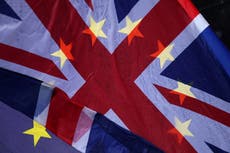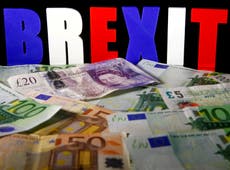There’s no doubt Brexit will be terrible – but we have to make the best of a bad job
Britain, and specifically its prime minister, is having to come to terms with the fact that it cannot have its cake and eat it

Your support helps us to tell the story
From reproductive rights to climate change to Big Tech, The Independent is on the ground when the story is developing. Whether it's investigating the financials of Elon Musk's pro-Trump PAC or producing our latest documentary, 'The A Word', which shines a light on the American women fighting for reproductive rights, we know how important it is to parse out the facts from the messaging.
At such a critical moment in US history, we need reporters on the ground. Your donation allows us to keep sending journalists to speak to both sides of the story.
The Independent is trusted by Americans across the entire political spectrum. And unlike many other quality news outlets, we choose not to lock Americans out of our reporting and analysis with paywalls. We believe quality journalism should be available to everyone, paid for by those who can afford it.
Your support makes all the difference.It’s very “Groundhog Day” isn’t it, this Brexit thing? Fish. Level playing field. Governance. Sticking points. Red lines. Working hard for a deal. Sovereignty. Time is short. Fish ... The only new element, and not an encouraging one, is that whereas both sides used to say that they weren’t getting very far, they can’t even agree on that now. Over the weekend EU sources told selected media that there’d been a piscatorial breakthrough: British sources angrily claimed that fish is not “sorted”. We can never be sure who’s being the more performative for the sake of the home audience.
Certainly a deal could be done very easily, if all sides conveniently forgot what Brexit is supposed to be about. It is helpful to try and recall that inconvenient point. Brexit is supposed to make Britain make a better economic living in the world. It is supposed to be about producing goods and services better and more cheaply than the EU does. Really, a “level playing field” is an impediment to that, which is why the EU insists on it.
Now, whether leaving the EU was a stupid idea or not, it is certainly happening (and has already happened legally), and we no longer have the choice of remaining in the EU. Brexit is reversible, for sure, but it would require a change of government and fresh negotiations on re-entry, including on scrapping the pound and adopting the Euro. Plus, probably, a referendum. That in turn would require the British people to regain their appetite for debating the merits of membership of the EU.
So that’s not going to happen for a while, even if Brexit is ghastly, which it will be. We have to make the best of a bad job. We have to take the world as it is and not as we would wish it to be. And that world is one where the UK has to make its own way. That means the maximum freedom to out-compete the EU. I would say fairly or not, but as fairness isn’t a legal or economically useful concept that needn’t worry us. It means the British, like the Chinese, Koreans, Indians, Japanese, or anyone else, order their affairs in such a way as to deliver the best living standards for their people. I repeat; staying in the EU might be the best way to do that, but it is no longer an option. We now have to have the flexibility to make the best of Brexit.
Britain has to develop its economy in new ways to suit itself. That was, after all, the whole point - the only valid point - of Brexit in the first place. The idea is that, like any other trading nation, British governments can reduce regulation, increase marketisation, introduce incentives, support training schemes, direct public infrastructure investment and sponsor science and research in the most effective manner (under democratic control).
The British, it is true, have not always been very successful at harnessing the white heat of global technological revolutions, but there we are. We have to give it a go - artificial intelligence, autonomous vehicles, fintech, space, logistics (especially), pharmaceutical research, our universities, green technologies, creative industries and all the other as yet undiscovered possible future industrial sectors.
If that all sounds like one of Boris Johnson’s silly speeches, I’m sorry, but it happens to be brutally true because much of our present economy will indeed be decimated by Brexit (something you won’t honestly hear from the prime minister or his colleagues, who prefer self-conscious euphemisms such as “bumps in the road” for inflicting no poverty on, say, Welsh farmers). Indeed, I would go further and argue that if it becomes apparent that Britain also needs to create employment in low skilled work via less generous minimum wage rates or looser environmental rules, then that is something that is up to the British people and parliament to decide on. The same principle goes for nationalising companies or distorting markets in ways the EU would find intolerable. Again, that is probably all inferior to the old UK deal of full EU membership with bespoke opt-outs, but that’s all gone now.
It might well be that we could do much of what is needed within the EU, and have a ready market for the results of such investment in new technologies too - but that, we have to recognise, is no longer an option. What is probably unworkable is agreeing to an EU-based “level playing field” rule book governing our economy with no say in how it is to be framed or governed (like we used to have as full members of course).
In other words Britain, and specifically its prime minister, is having to come to terms with the fact that it cannot have its cake and eat it. There is full membership of the EU; and there is a life outside it, so called hard Brexit. But what is being negotiated now is a form of soft Brexit which represents not sensible compromise, but the worst of both worlds: a bad deal, in other words.
Going back to the unholy trio again, fishing rights should be traded for tariff and quota free access to the single market - an obviously sensible approach given that there is far more fish than the British can possibly eat.
But the “level playing field” (and deal “governance”) is more of a trap. The freedom - in all honesty - for Britain to try to unlevel the playing field via changes to laws, rules, licensing, taxes, subsidies, incentives, minimum wages, the social security system, university research, and all the rest, is too precious to trade away. Without that freedom, and outside the European Union with no voice, the British will be permanently poorer - but also unable to try to do much about it. What was it that we used to say about a “bad deal”?



Join our commenting forum
Join thought-provoking conversations, follow other Independent readers and see their replies
Comments